《道德经》导读
- 格式:ppt
- 大小:1.01 MB
- 文档页数:38
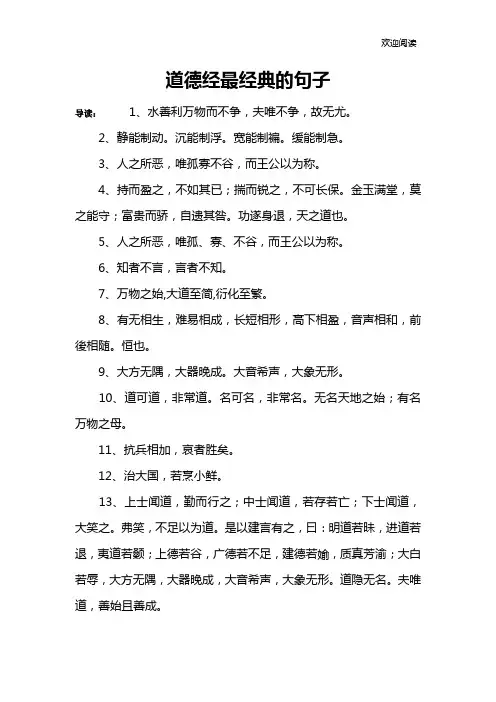
道德经最经典的句子导读:1、水善利万物而不争,夫唯不争,故无尤。
2、静能制动。
沉能制浮。
宽能制褊。
缓能制急。
3、人之所恶,唯孤寡不谷,而王公以为称。
4、持而盈之,不如其已;揣而锐之,不可长保。
金玉满堂,莫之能守;富贵而骄,自遗其咎。
功遂身退,天之道也。
5、人之所恶,唯孤、寡、不谷,而王公以为称。
6、知者不言,言者不知。
7、万物之始,大道至简,衍化至繁。
8、有无相生,难易相成,长短相形,高下相盈,音声相和,前後相随。
恒也。
9、大方无隅,大器晚成。
大音希声,大象无形。
10、道可道,非常道。
名可名,非常名。
无名天地之始;有名万物之母。
11、抗兵相加,哀者胜矣。
12、治大国,若烹小鲜。
13、上士闻道,勤而行之;中士闻道,若存若亡;下士闻道,大笑之。
弗笑,不足以为道。
是以建言有之,曰:明道若昧,进道若退,夷道若颡;上德若谷,广德若不足,建德若媮,质真芳渝;大白若辱,大方无隅,大器晚成,大音希声,大象无形。
道隐无名。
夫唯道,善始且善成。
14、重为轻根,静为躁君。
轻则失根,躁则失君。
15、道生一。
一生二。
二生三。
三生万物。
16、无为,无我,无欲,居下,清虚,自然。
17、专气致柔,能如婴儿乎?涤除玄览,能无疵乎?18、致虚极,守静笃,万物并作,吾以观复。
夫物芸芸,各归其根。
归根曰静,静曰复命。
复命曰常,知常曰明,不知常,妄作,凶。
知常容,容乃公,公乃王,王乃天,天乃道,道乃久。
没身不殆。
19、千里之行,始于足下。
20、天地不仁,以万物为刍狗;圣人不仁,以百姓为刍狗。
21、其政闷闷,其民淳淳;其政察察,其民缺缺。
是以圣人方而不割,廉而不刿,直而不肆,光而不耀。
22、是以圣人为而不恃,功成而不处,其不欲见贤。
23、知者不言。
言者不知。
挫其锐,解其纷,和其光,同其尘,是谓玄同。
故不可得而亲。
不可得而疏。
24、生命,除了生命本身之外,一无所有。
25、大成若缺,其用不弊;大盈若冲,其用不穷。
大直若屈,大巧若拙,大辩若讷。

老子《道德经》第二十二章原文、注释、译文、导读及解析(收藏版),《道德经》被誉为“万经之王”,内容涵盖哲学、伦理学、政治学、军事学等诸多学科,曾被后人尊奉为治国、齐家、修身、为学的宝典。
它对我国的哲学、科学、政治、宗教等都产生了深远的影响,体现了古人的一种世界观和人生观。
《道德经》作为道教基本教义的重要构成之一,被道教视为重要经典,其作者老子也被道教视为至上的三清之一道德天尊的化身,又称太上老君,所以应该说道教吸纳了道家思想,道家思想完善了道教。
《道德经》分上下两篇,原文上篇《德经》、下篇《道经》,不分章,后改为《道经》在前,《德经》在后,并分为81章,全文共约五千字,是中国历史上首部完整的哲学著作。
@泽光书院计划用81天时间,对《道德经》中的81章,每天一章节进行解析和译文,希望能帮助大家学习理解《道德经》。
第22章圣人抱一【原文】曲则全,枉则直,洼则盈,敝则新,少则得,多则惑。
是以圣人抱一为天下式①。
不自见,故明;不自是,故彰;不自伐②,故有功;不自矜(jīn)⑨,故长。
夫唯不争,故天下莫能与之争④。
古之所谓“曲则全”者,岂虚言哉!诚全而归之。
【注释】①式:这里可以理解为法则。
②伐:夸耀。
③矜(jīn):自高自大的意思。
④莫:没有谁。
【译文】委曲反而能得到保全,屈就反而能得到伸展,低洼反而能得到充盈,破旧反而能生新,少取反而能多得,贪多反而会产生迷惑。
因此有道的人坚守这一原则作为治理天下的范式。
不自我表扬,反而能显明;不自以为是,反而能是非彰明;不自吹自擂,反而能功勋卓著;不自高自大,反而能长久。
正因为善于谦让不与世人相争,所以天下反而没有谁能与之争高低。
古人所说的“曲则全”等话,怎么会是空话呢?它是实实在在能够达到的。
【导读】老子用连续的六句话“曲则全,枉则直,洼则盈,敝则新,少则得,多则惑”来表达了以退为进、不争而争的处世方式。
一味求强、求盈,只会导致失败。
【解析】在本章中,老子论述的重点在于“不争”。
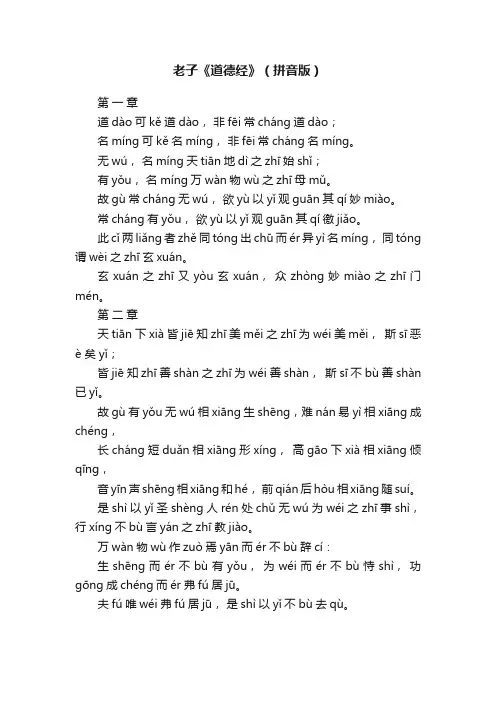
老子《道德经》(拼音版)第一章道dào可kě道dào,非fēi常cháng道dào;名míng可kě名míng,非fēi常cháng名míng。
无wú,名míng天tiān地dì之zhī始shǐ;有yǒu,名míng万wàn物wù之zhī母mǔ。
故gù常cháng无wú,欲yù以yǐ观guān其qí妙miào。
常cháng有yǒu,欲yù以yǐ观guān其qí徼jiǎo。
此cǐ两liǎng者zhě同tóng出chū而ér异yì名míng,同tóng 谓wèi之zhī玄xuán。
玄xuán之zhī又yòu玄xuán,众zhòng妙miào之zhī门mén。
第二章天tiān下xià皆jiē知zhī美měi之zhī为wéi美měi,斯sī恶è 矣yǐ;皆jiē知zhī善shàn之zhī为wéi善shàn,斯sī不bù善shàn 已yǐ。
故gù有yǒu无wú相xiāng生shēng,难nán易yì相xiāng成chéng,长cháng短duǎn相xiāng形xíng,高gāo下xià相xiāng倾qīng,音yīn声shēng相xiāng和hé,前qián后hòu相xiāng随suí。
是shì以yǐ圣shèng人rén处chǔ无wú为wéi之zhī事shì,行xíng不bù言yán之zhī 教jiào。
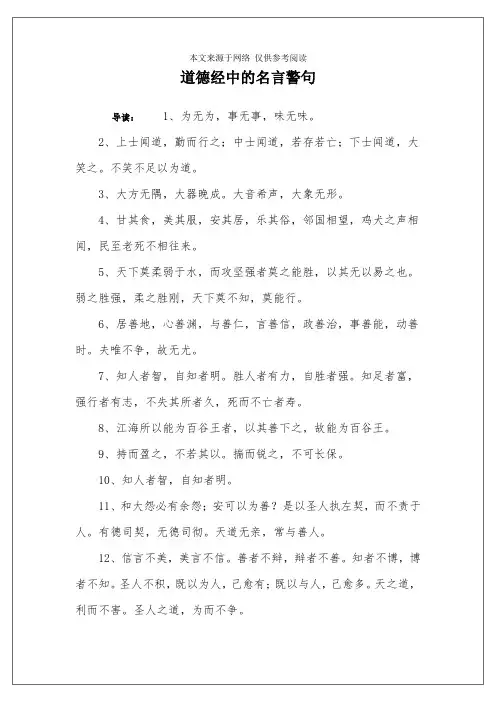
道德经中的名言警句导读:1、为无为,事无事,味无味。
2、上士闻道,勤而行之;中士闻道,若存若亡;下士闻道,大笑之。
不笑不足以为道。
3、大方无隅,大器晚成。
大音希声,大象无形。
4、甘其食,美其服,安其居,乐其俗,邻国相望,鸡犬之声相闻,民至老死不相往来。
5、天下莫柔弱于水,而攻坚强者莫之能胜,以其无以易之也。
弱之胜强,柔之胜刚,天下莫不知,莫能行。
6、居善地,心善渊,与善仁,言善信,政善治,事善能,动善时。
夫唯不争,故无尤。
7、知人者智,自知者明。
胜人者有力,自胜者强。
知足者富,强行者有志,不失其所者久,死而不亡者寿。
8、江海所以能为百谷王者,以其善下之,故能为百谷王。
9、持而盈之,不若其以。
揣而锐之,不可长保。
10、知人者智,自知者明。
11、和大怨必有余怨;安可以为善?是以圣人执左契,而不责于人。
有德司契,无德司彻。
天道无亲,常与善人。
12、信言不美,美言不信。
善者不辩,辩者不善。
知者不博,博者不知。
圣人不积,既以为人,己愈有;既以与人,己愈多。
天之道,利而不害。
圣人之道,为而不争。
13、生命,除了生命本身之外,一无所有。
14、物壮则老,是谓不道,不道早已。
15、道常无名,朴虽小,天下不敢臣。
16、人之所恶,唯孤、寡、不谷,而王公以为称。
17、上善若水,水善利万物而不争。
处众人之所恶,故几于道。
居善地,心善渊,与善仁,言善信,政善治,事善能,动善时。
夫唯不争,故无尤。
18、圣人自知不自见;自爱不自贵。
19、我有三宝,持而保之。
一曰慈,二曰俭,三曰不敢为天下先。
慈故能勇;俭故能广;不敢为天下先,故能成器长。
20、天长地久,天地所以能长且久者,以其不自生,故能长生。
是以圣人后其身而身先,外其身而身存。
以其无私,故能成其私。
21、故善人者,不善人之师;不善人者,善人之资。
不贵其师,不爱其资,虽智大迷,是谓要妙。
22、将欲歙之,必故张之;将欲弱之,必故强之;将欲废之,必故兴之;将欲取之,必故与之。
是谓微明。
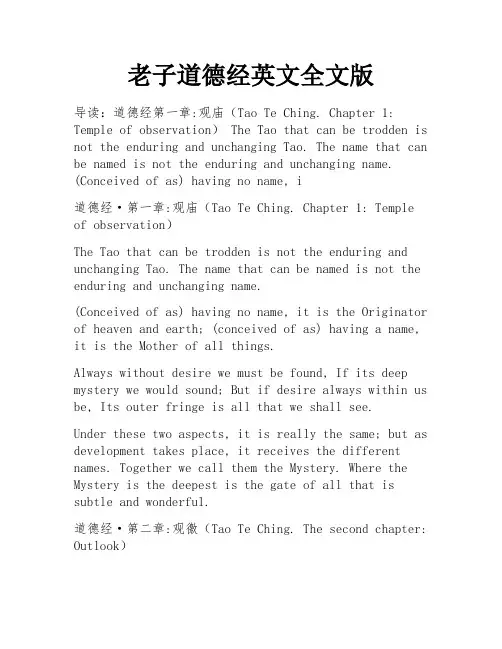
老子道德经英文全文版导读:道德经第一章:观庙(Tao Te Ching. Chapter 1: Temple of observation) The Tao that can be trodden is not the enduring and unchanging Tao. The name that can be named is not the enduring and unchanging name. (Conceived of as) having no name, i道德经·第一章:观庙(Tao Te Ching. Chapter 1: Temple of observation)The Tao that can be trodden is not the enduring and unchanging Tao. The name that can be named is not the enduring and unchanging name.(Conceived of as) having no name, it is the Originator of heaven and earth; (conceived of as) having a name, it is the Mother of all things.Always without desire we must be found, If its deep mystery we would sound; But if desire always within us be, Its outer fringe is all that we shall see.Under these two aspects, it is really the same; but as development takes place, it receives the different names. Together we call them the Mystery. Where the Mystery is the deepest is the gate of all that is subtle and wonderful.道德经·第二章:观徼(Tao Te Ching. The second chapter: Outlook)All in the world know the beauty of the beautiful, and in doing thisthey have (the idea of) what ugliness is; they all know the skill of the skilful, and in doing this they have (the idea of) what the want of skill is.So it is that existence and non-existence give birth the one to (the idea of) the other; that difficulty and ease produce the one (the idea of) the other; that length and shortness fashion out the one the figure of the other; that (the ideas of) height and lownessarise from the contrast of the one with the other;that the musical notes and tones bee harmonious through the relation of one with another; and that being before and behind give the idea of one following another.Therefore the sage manages affairs without doing anything, and conveys his instructions without the use of speech.All things spring up, and there is not one which declines to show itself; they grow, and there is no claim made for their ownership; they go through their processes, and there is no expectation (of a rewardfor the results). The work is acplished, and there is no resting in it (as an achievement).The work is done, but how no one can see; 'Tis this that makes the power not cease to be.道德经·第三章:安民(Tao Te Ching. The third chapter: Peace)Not to value and employ men of superior ability is the way to keep the people from rivalry among themselves; not to prize articles which are difficult to procureis the way to keep them from being thieves; not to show them what is likely to excite their desires isthe way to keep their minds from disorder.Therefore the sage, in the exercise of his government, empties theirminds, fills their bellies, weakens their wills, and strengthens their bones.He constantly (tries to) keep them without knowledge and without desire, and where there are those who have knowledge, to keep them from presuming to act (on it). When there is this abstinence from action, good orderis universal.道德经·第四章:不盈(Tao Te Ching. The fourth chapter: inefficiency)The Tao is (like) the emptiness of a vessel; and inour employment of it we must be on our guard againstall fulness. How deep and unfathomable it is, as if it were the Honoured Ancestor of all things!We should blunt our sharp points, and unravel the plications of things; we should attemper our brightness, and bring ourselves into agreement withthe obscurity of others. How pure and still the Tao is, as if it would ever so continue!I do not know whose son it is. It might appear to have been before God.道德经·第五章:守中(Tao Te Ching. The fifth chapter: Guarding)Heaven and earth do not act from (the impulse of) any wish to be benevolent; they deal with all things asthe dogs of grass are dealt with. The sages do not act from (any wish to be) benevolent; they deal with the people as the dogs of grass are dealt with.May not the space between heaven and earth be pared to a bellows?'Tis emptied, yet it loses not its power;'Tis moved again, and sends forth air the more. Much speech to swift exhaustion lead we see; Your inner being guard, and keep it free.道德经·第六章:谷神(Tao Te Ching. The sixth chapter: Cereal God)The valley spirit dies not, aye the same;The female mystery thus do we name.Its gate, from which at first they issued forth,Is called the root from which grew heaven and earth.Long and unbroken does its power remain,Used gently, and without the touch of pain.道德经·第七章:无私(Tao Te Ching. The seventh chapter: selflessness)Heaven is long-enduring and earth continues long. The reason why heaven and earth are able to endure and continue thus long is because they do not live of, or for, themselves. This is how they are able to continue and endure.Therefore the sage puts his own person last, and yetit is found in the foremost place; he treats hisperson as if it were foreign to him, and yet that person is preserved. Is it not because he has no personal and private ends, that therefore such endsare realised?道德经·第八章:若水(Tao Te Ching. The eighth chapter: Ruo Shui)The highest excellence is like (that of) water. The excellence of water appears in its benefiting all things, and in its occupying, without striving (to the contrary), the low place which all men dislike. Hence (its way) is near to (that of) the Tao.The excellence of a residence is in (the suitability of) the place; that of the mind is in abysmal stillness; that of associations is in their being with the virtuous; that of government is in its securing good order; that of (the conduct of) affairs is in itsability; and that of (the initiation of) any movement is in its timeliness.And when (one with the highest excellence) does not wrangle (about his low position), no one finds fault with him.道德经·第九章:持盈(Tao Te Ching. The ninth chapter: holding profit)It is better to leave a vessel unfilled, than to attempt to carry it when it is full. If you keep feeling a point that has been sharpened, the point cannot long preserve its sharpness.When gold and jade fill the hall, their possessor cannot keep them safe. When wealth and honours lead to arrogancy, this brings its evil on itself. When the work is done, and one's name is being distinguished, to withdraw into obscurity is the way of Heaven.道德经·第十章:玄德(Tao Te Ching. The tenth chapter: Xuan de)When the intelligent and animal souls are held together in one embrace, they can be kept from separating. When one gives undivided attention to the (vital) breath, and brings it to the utmost degree of pliancy, he can bee as a (tender) babe. When he has cleansed away the most mysterious sights (of his imagination), he can bee without a flaw.In loving the people and ruling the state, cannot he proceed without any (purpose of) action? In theopening and shutting of his gates of heaven, cannot he do so as a female bird? While his intelligence reaches in every direction, cannot he (appear to) be without knowledge?(The Tao) produces (all things) and nourishes them; it produces them and does not claim them as its own; it does all, and yet does not boast of it; it presides over all, and yet does not control them. This is what is called 'The mysterious Quality' (of the Tao).。
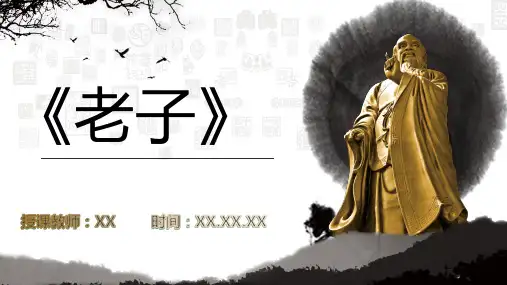
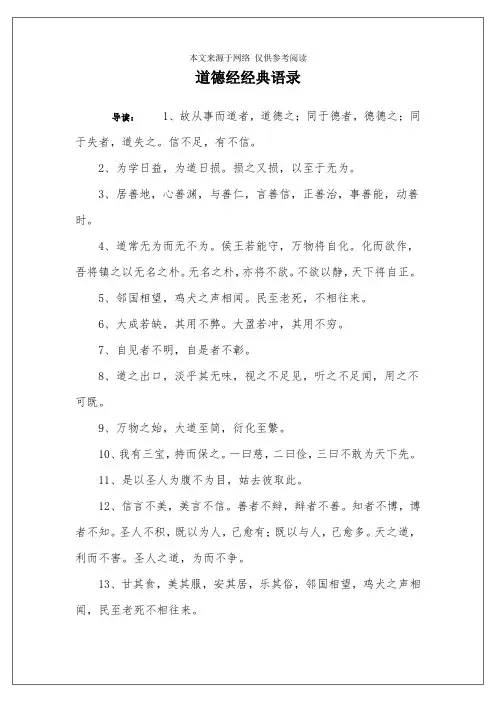
道德经经典语录导读:1、故从事而道者,道德之;同于德者,德德之;同于失者,道失之。
信不足,有不信。
2、为学日益,为道日损。
损之又损,以至于无为。
3、居善地,心善渊,与善仁,言善信,正善治,事善能,动善时。
4、道常无为而无不为。
侯王若能守,万物将自化。
化而欲作,吾将镇之以无名之朴。
无名之朴,亦将不欲。
不欲以静,天下将自正。
5、邻国相望,鸡犬之声相闻。
民至老死,不相往来。
6、大成若缺,其用不弊。
大盈若冲,其用不穷。
7、自见者不明,自是者不彰。
8、道之出口,淡乎其无味,视之不足见,听之不足闻,用之不可既。
9、万物之始,大道至简,衍化至繁。
10、我有三宝,持而保之。
一曰慈,二曰俭,三曰不敢为天下先。
11、是以圣人为腹不为目,姑去彼取此。
12、信言不美,美言不信。
善者不辩,辩者不善。
知者不博,博者不知。
圣人不积,既以为人,己愈有;既以与人,己愈多。
天之道,利而不害。
圣人之道,为而不争。
13、甘其食,美其服,安其居,乐其俗,邻国相望,鸡犬之声相闻,民至老死不相往来。
14、圣人不积,既以为人己愈有,既以与人己愈多。
15、江海所以能为百谷王者,以其善下之,故能为百谷王。
16、道大,天大,地大,王大。
域中有四大,而王处一。
人法地,地法天,天法道,道法自然。
17、持而盈之,不知其已;揣而锐之,不可长保。
18、上士闻道,勤能行之;中士闻道,若存若亡;下士闻道,大笑之。
19、知人者智,自知者明。
20、曲则全,枉则直,洼则盈,敝则新,少则得,多则惑。
21、众人皆有以,而我独顽似鄙。
22、将欲歙之,必固张之;将欲弱之,必固强之;将欲废之,必固兴之;将欲取之,必固与之。
是谓微明。
柔弱胜刚强。
鱼不可脱于渊,国之利器,不可以示人。
23、太上,下知有之。
其次,亲而誉之。
其次,畏之。
其次,侮之。
24、天地不仁,以万物为刍狗;圣人不仁,以百姓为刍狗。
天地之间,其犹橐龠乎?虚而不屈,动而俞出。
多言数穷,不如守中。
25、抗兵相加,哀者胜矣。

TAO TE CHING老子《道德经》,春秋时期老子所著的哲学作品,又称《道德真经》《老子》《五千言》《老子五千文》,是中国古代先秦诸子分家前的一部著作,是道家哲学思想的重要来源。
教育部推荐中小学学生阅读指导书目国学教育TRADITIONAL CULTURE EDUCATION道德经目录壹作品简介贰作者介绍叁文段赏析肆作品鉴赏国学教育TRADITIONAL CULTURE EDUCATION作品简介《道德经》,春秋时期老子所著的哲学作品,又称《道德真经》《老子》《五千言》《老子五千文》,是中国古代先秦诸子分家前的一部著作,是道家哲学思想的重要来源。
老子国学教育TRADITIONAL CULTURE EDUCATION•道德经分上下两篇,原文上篇《德经》、下篇《道经》,不分章,后改为前37章为《道经》,第38章之后为《德经》,并分为81章。
•文本以哲学意义之“道德”为纲宗,论述修身、治国、用兵、养生之道,而多以政治为旨归,乃所谓“内圣外王”之学,文意深奥,包涵广博,被誉为万经之王。
•是中国历史上最伟大的名著之一,对传统哲学、科学、政治、宗教等产生了深刻影响 。
据联合国教科文组织统计,《道德经》是除了《圣经》以外被译成外国文字发布量最多的文化名著。
《道德经》又称《老子》、《五千言》,是中国古代先秦诸子分家前的一部哲学著作,是道家哲学思想 的重要来源。
大约周敬王三十五年(鲁哀公十年、公元前485年)老子看到周王朝越来越衰败,就离开故土,准备出函谷关去四处云游。
把守函谷关的长官尹喜很敬佩老子,听说他来到函谷关,非常高兴。
可是当他知道老子要出关去云游,又觉得很可惜,就想设法留住老子。
于是,尹喜就对老子说:“先生想出关也可以,但是得留下一部著作。
”老子听后,就在函谷关住了几天。
几天后,他交给尹喜一篇五千字左右的著作,然后就骑着大青牛走了。
据说,这篇著作就是后来传世的《道德经》。
此书由来作者介绍《道德经》,春秋时期老子所著的哲学作品,又称《道德真经》《老子》《五千言》《老子五千文》,是中国古代先秦诸子分家前的一部著作,是道家哲学思想的重要来源。
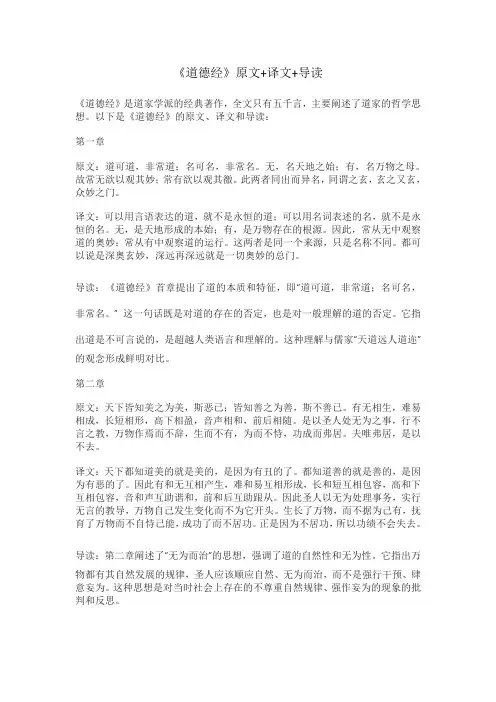
《道德经》原文+译文+导读《道德经》是道家学派的经典著作,全文只有五千言,主要阐述了道家的哲学思想。
以下是《道德经》的原文、译文和导读:第一章原文:道可道,非常道;名可名,非常名。
无,名天地之始;有,名万物之母。
故常无欲以观其妙;常有欲以观其徼。
此两者同出而异名,同谓之玄,玄之又玄,众妙之门。
译文:可以用言语表达的道,就不是永恒的道;可以用名词表述的名,就不是永恒的名。
无,是天地形成的本始;有,是万物存在的根源。
因此,常从无中观察道的奥妙;常从有中观察道的运行。
这两者是同一个来源,只是名称不同。
都可以说是深奥玄妙,深远再深远就是一切奥妙的总门。
导读:《道德经》首章提出了道的本质和特征,即“道可道,非常道;名可名,非常名。
” 这一句话既是对道的存在的否定,也是对一般理解的道的否定。
它指出道是不可言说的,是超越人类语言和理解的。
这种理解与儒家“天道远人道迩”的观念形成鲜明对比。
第二章原文:天下皆知美之为美,斯恶已;皆知善之为善,斯不善已。
有无相生,难易相成,长短相形,高下相盈,音声相和,前后相随。
是以圣人处无为之事,行不言之教,万物作焉而不辞,生而不有,为而不恃,功成而弗居。
夫唯弗居,是以不去。
译文:天下都知道美的就是美的,是因为有丑的了。
都知道善的就是善的,是因为有恶的了。
因此有和无互相产生,难和易互相形成,长和短互相包容,高和下互相包容,音和声互助谐和,前和后互助跟从。
因此圣人以无为处理事务,实行无言的教导,万物自己发生变化而不为它开头。
生长了万物,而不据为己有,抚育了万物而不自恃己能,成功了而不居功。
正是因为不居功,所以功绩不会失去。
导读:第二章阐述了“无为而治”的思想,强调了道的自然性和无为性。
它指出万物都有其自然发展的规律,圣人应该顺应自然、无为而治,而不是强行干预、肆意妄为。
这种思想是对当时社会上存在的不尊重自然规律、强作妄为的现象的批判和反思。
总之,《道德经》的原文、译文和导读是非常深奥和复杂的哲学思想体系。
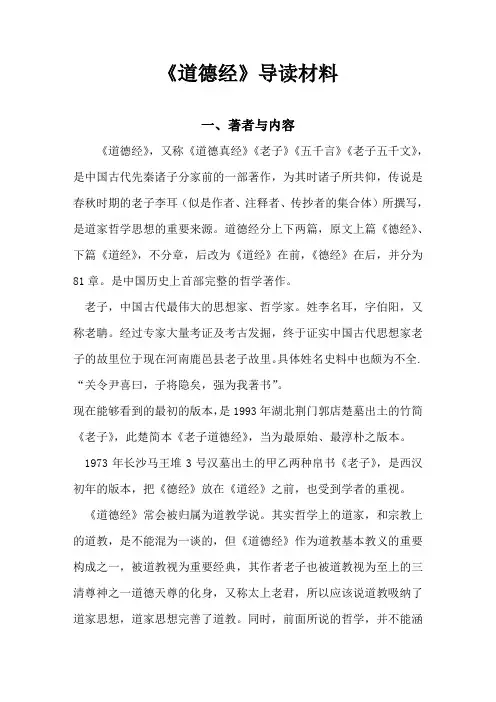
《道德经》导读材料一、著者与内容《道德经》,又称《道德真经》《老子》《五千言》《老子五千文》,是中国古代先秦诸子分家前的一部著作,为其时诸子所共仰,传说是春秋时期的老子李耳(似是作者、注释者、传抄者的集合体)所撰写,是道家哲学思想的重要来源。
道德经分上下两篇,原文上篇《德经》、下篇《道经》,不分章,后改为《道经》在前,《德经》在后,并分为81章。
是中国历史上首部完整的哲学著作。
老子,中国古代最伟大的思想家、哲学家。
姓李名耳,字伯阳,又称老聃。
经过专家大量考证及考古发掘,终于证实中国古代思想家老子的故里位于现在河南鹿邑县老子故里。
具体姓名史料中也颇为不全.“关令尹喜曰,子将隐矣,强为我著书”。
现在能够看到的最初的版本,是1993年湖北荆门郭店楚墓出土的竹简《老子》,此楚简本《老子道德经》,当为最原始、最淳朴之版本。
1973年长沙马王堆3号汉墓出土的甲乙两种帛书《老子》,是西汉初年的版本,把《德经》放在《道经》之前,也受到学者的重视。
《道德经》常会被归属为道教学说。
其实哲学上的道家,和宗教上的道教,是不能混为一谈的,但《道德经》作为道教基本教义的重要构成之一,被道教视为重要经典,其作者老子也被道教视为至上的三清尊神之一道德天尊的化身,又称太上老君,所以应该说道教吸纳了道家思想,道家思想完善了道教。
同时,前面所说的哲学,并不能涵括《道德经》(修身立命、治国安邦、出世入世)的全貌。
《道德经》提出了“无为而治”的主张,成为中国历史上某些朝代,如西汉初的治国方略,在经济上能够缓解人民的压力,对早期中国的稳定起到过一定作用。
历史上《道德经》注者如云,甚至有几位皇帝都为其作注。
《道德经》本为先秦道家的代表作,汉末张陵创五斗米道,奉老子为教祖,尊称为太上老君,以《老子五千文》为教典教悔道徒,创立了道教,并作《老子想尔注》以宗教的观点解释《老子五千文》,自此成为道教的基本经典。
《道德经》为韵文哲理诗体。
《庄子天下篇》括其旨曰:以本为精,以物为粗,以有积为不足,澹然独居神明居。
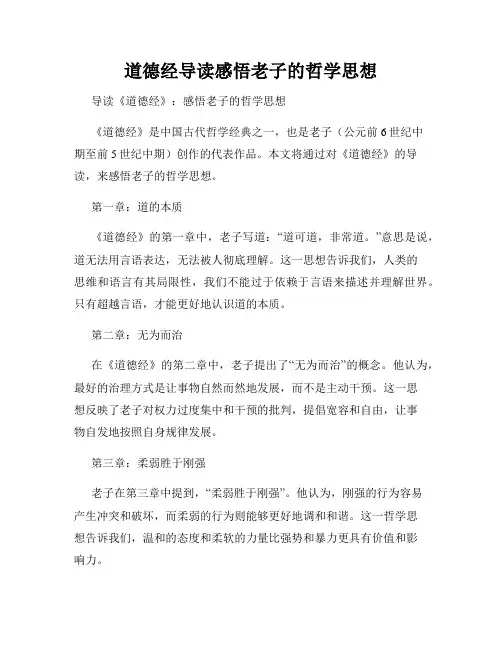
道德经导读感悟老子的哲学思想导读《道德经》:感悟老子的哲学思想《道德经》是中国古代哲学经典之一,也是老子(公元前6世纪中期至前5世纪中期)创作的代表作品。
本文将通过对《道德经》的导读,来感悟老子的哲学思想。
第一章:道的本质《道德经》的第一章中,老子写道:“道可道,非常道。
”意思是说,道无法用言语表达,无法被人彻底理解。
这一思想告诉我们,人类的思维和语言有其局限性,我们不能过于依赖于言语来描述并理解世界。
只有超越言语,才能更好地认识道的本质。
第二章:无为而治在《道德经》的第二章中,老子提出了“无为而治”的概念。
他认为,最好的治理方式是让事物自然而然地发展,而不是主动干预。
这一思想反映了老子对权力过度集中和干预的批判,提倡宽容和自由,让事物自发地按照自身规律发展。
第三章:柔弱胜于刚强老子在第三章中提到,“柔弱胜于刚强”。
他认为,刚强的行为容易产生冲突和破坏,而柔弱的行为则能够更好地调和和谐。
这一哲学思想告诉我们,温和的态度和柔软的力量比强势和暴力更具有价值和影响力。
第四章:天行健,君子以自强不息《道德经》的第四章中,老子表达了自然界的运行法则。
他说:“天行健,君子以自强不息。
”这一思想告诉我们,自然界中的万物都有自己的规律和既定运行方式,我们应该学习这种自强不息的精神,追求个人的成长和进步。
第五章:尊重自然在第五章中,老子提出了“天地不仁,以万物为刍狗”的观点。
他认为,自然界没有善恶的区别,而是一视同仁地对待所有的生命。
这一思想告诉我们,人类应该尊重和保护自然,与自然和谐相处,不要过于人为地干预和破坏。
第六章:智者不言《道德经》的第六章中,老子提到:“谷神不死,是谓玄牝。
”他的意思是,最高境界的智者不言而喻,无需言语来表达自己的思想。
这一思想告诉我们,真正的智慧不在于口头的辩论和争论,而在于内心的洞察和领悟。
第七章:返璞归真在第七章中,老子强调了返璞归真的重要性。
他说:“天长地久,天地之所以能长且久者,以其不自生,故能长生。
道德经导读测试题及答案一、填空题1. 《道德经》的作者是__________。
2. 《道德经》又称为__________。
3. 《道德经》的核心思想是__________。
4. “道可道,非常道”出自《道德经》的第______章。
5. “上善若水”一语出自《道德经》的第______章。
二、选择题1. 《道德经》的作者是以下哪位?A. 孔子B. 老子C. 庄子D. 孟子答案:B2. “道生一,一生二,二生三,三生万物”这句话出自《道德经》的哪一章?A. 第一章B. 第二章C. 第三章D. 第四章答案:C3. 下列哪项不是《道德经》中提到的“无为而治”的体现?A. 以无事取天下B. 以正治国C. 以奇用兵D. 以无欲观其妙答案:B三、简答题1. 简述《道德经》中“道”的概念。
2. 解释“无为而治”在《道德经》中的含义。
3. 阐述《道德经》中“柔弱胜刚强”的思想。
四、论述题1. 论述《道德经》对后世哲学思想的影响。
2. 分析《道德经》中“道法自然”的哲学意义。
五、翻译题1. 将《道德经》第33章的“知人者智,自知者明。
胜人者有力,自胜者强。
”翻译成英文。
2. 将《道德经》第56章的“知者不言,言者不知。
塞其兑,闭其门;挫其锐,解其纷;和其光,同其尘,是谓玄同。
”翻译成英文。
六、案例分析题1. 阅读《道德经》第63章:“为无为,事无事,味无味。
大小多少,报怨以德。
图难于其易,为大于其细;天下难事,必作于易,天下大事,必作于细。
是以圣人终不为大,故能成其大。
”结合实际生活,谈谈你对这段话的理解。
七、思考题1. 在现代社会中,如何应用《道德经》中的智慧?2. 《道德经》提倡的“无为而治”是否适用于现代企业管理?答案:一、填空题1. 老子2. 老子五千文3. 道法自然4. 一5. 八二、选择题1. B2. C3. B三、简答题1. 《道德经》中的“道”是指宇宙万物的本源和运行规律,是一种超越形而上的存在,无形无象,不可言说。
中学课外名著导读:《道德经》重要知识点分类详解一、写作背景:据文献记载,老子静思好学,知识渊博。
他的老师商容教授知识过程中,老子总是寻根问底,对知识非常的渴望。
为了解开自己的疑惑,他经常仰头观日月星辰,思考天上之天为何物,以至于经常睡不着觉。
后来,商容老师'实乃老夫之学有尽。
'推荐老子入周都深造。
文献记载:'老子入周,拜见博士,入太学,天文、地理、人伦,无所不学,《诗》《书》《易》《历》《礼》《乐》无所不览,文物、典章、史书无所不习,学业大有长进。
博士又荐其入守藏室为吏。
守藏室是周朝典籍收藏之所,集天下之文,收天下之书,汗牛充栋,无所不有。
'通过这段经历,老子积累了丰富的学识,也使他远近闻名。
老子生于春秋战国时期,当时的环境是周朝势微,各诸侯为了争夺霸主地位,战争不断。
严酷的动乱与变迁,让老子目睹到民间疾苦,作为周朝的守藏史,于是他提出了治国安民的一系列主张。
函谷关令尹喜对《道德经》的成书也起了巨大作用,他少时即好观天文、爱读古籍,修养深厚。
司马迁在《史记老子传》中记载老子'居周久之,见周之衰,乃遂去。
至关,关(令)尹喜曰:子将隐矣,强为我著书,于是老子言道德五千言而去,莫知始终',尹喜感动了老子,老子遂以自己的生活体验和以王朝兴衰成败、百姓安危祸福为鉴,溯其源,著上、下两篇,共五千言,即《道德经》。
二、内容概述:《道德经》被誉为“万经之王”、“百科全书”。
有说它是言哲思的,有说它是言智术的,有说它是言兵事的。
但它总的是说如何“得道”的大道理,故《道德经》或可称《得道经》。
《道德经》文约义丰,全书5千余言,81章,分上下两篇,上篇称《道经》,下篇称《德经》。
《道经》讲述了宇宙的根本,道出了天地万物变化的玄机,表达了宇宙和自然的总规律,《德经》说的是处世的方略,道出了人事进退之术,表达了人类的人生观和道德观。
“道”是“德”的根本,“德”是“道”的载体,是“道”的体现。
道德经导读人生哲理修身齐家治国平天下道德经作为中国古代哲学的经典之作,凝聚了众多智慧和思考。
它以简练的语言,深刻的哲理蕴含着丰富的人生道理,对于修身齐家治国平天下提供了重要的指导。
本文将通过对道德经的导读,探讨其中的人生哲理。
第一章:修身篇修身是人生修行的基础,道德经强调了个人修身的重要性。
在修身篇中,道德经告诉我们,要以谦卑、寡欲、自律作为修身的基石。
人应该追求内心的平静,并抛弃功利和虚荣心。
经中云:“知足不辱,知止不殆。
”这句话告诫人们要懂得知足,不要贪婪追求物质的无尽享受,只有了解自己真正的需求,才能摆脱浮躁的心态,保持内心的平衡。
第二章:齐家篇齐家是建立在个人修身的基础上的,它要求个人在家庭中起到良好的表率作用。
道德经提出了几个在齐家中很重要的观点。
首先是以家庭和睦为重要目标,要注重家庭成员间的和谐相处。
其次是以孝敬父母为核心,尊敬父母是中华民族传统美德,道德经中尤为强调要孝敬双亲,认为孝敬父母是修身齐家志向的核心。
第三章:治国篇治国是指在社会中扮演重要角色的人应有的行为规范。
道德经对于治国给出了指导方针。
经中说:“治人事天莫若贵其尊。
”道德经鼓励领导者要重视人民的尊严和权益,只有尊重人民,才能得到人民的拥护和信任。
此外,道德经还强调领导者应该以德治国,做到以身作则,率先垂范。
第四章:平天下篇平天下是治理国家的重要目标,也是全体公民的共同责任。
道德经强调了几个成功实现平天下的方法。
首先是以无为而治。
道德经认为,过度干涉会破坏天地之道,只有放下自己的私利,顺应事物自然的发展,才能达到天下太平的境地。
其次是强调亲和力,道德经告诉我们,领导者要以柔和的力量来感召人民,而非以强制手段。
总结:道德经作为一部古代哲学经典,它的意义超越了时代和国度。
通过对其导读,我们了解到了修身齐家治国平天下的重要性和方法。
只有个人以道德为准则来修身,才能够齐家和治国。
只有领导者以德治国,才能够实现治国平天下的宏伟目标。
道 德 经《老子》第一章 d ào k ěd àof ēi ch án ɡd àom ín ɡ k ěm ín ɡf ēi ch án ɡm ínɡ道 w ú 可 道 , m ínɡti ān d ì非 常 道 。
名 可 zh ī sh ǐ y ǒu m ínɡw àn 名 w ù , zh ī非 常 名 。
m ǔ 无 名 天 地 之 始 ; 有 名 万 物 之 母 。
ɡù ch án ɡw ú y ù y ǐ ɡu ān q í mi ào ch án ɡy ǒu y ù y ǐ ɡu ān q í j i ǎo c ǐ l i ǎn ɡ 故常无,欲以观其妙;常有,欲以观其徼.此两zh ě t ón ɡch ū éry ì m ín ɡt ón ɡw èizh ī xu án xu án zh ī y òu xu án zh òn ɡmi ào zh ī m én者,同出而异名,同谓之玄.玄之又玄,众妙之门.《老子》第二章ti ān xi à j i ē zh ī m ěi zh ī w éi m ěi s ī è y ǐ ji ē zh ī sh àn zh ī w éi 天下皆知美之为美,斯恶已。
皆知善之为 sh àn s ī b ú sh àn y ǐ 善 ,斯不善 已 。
y ǒu w ú xi ān ɡsh ēn ɡ n án y ì xi ān ɡch én ɡ ch án ɡdu ǎnxi ān ɡx ín ɡ ɡāo xi à xi ān ɡy ín ɡ 有 无 相 生 , 难 y īn sh ēn ɡxi ān ɡh é , 音 声 相 和 , 易 相 成 , 长 短 相 形 , 高 qi án h òu xi ān ɡsu í h én ɡ y ě前 后 相 随 。